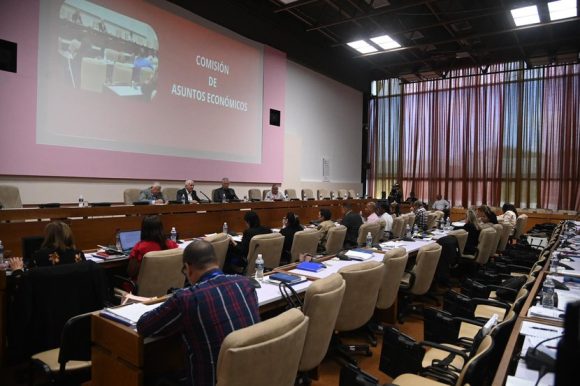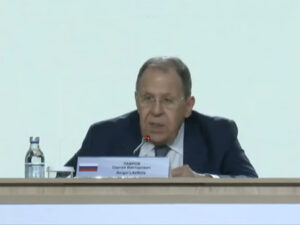In 2025 we will have a much better fiscal performance than in 2024, which has already been satisfactory, taking into account that in the period that ends, according to preliminary calculations, the fiscal deficit will be reduced by about 47%, according to previously approved figures, and for the first time since 2014, it was concentrated in capital expenditure, because there was a surplus in the current account.
The encouraging results were presented this Monday afternoon by the Minister of Finance and Prices, Vladimir Regueiro Alex, before the committees of Economic Affairs and Constitutional and Legal Affairs of the 10th Legislature of the National Assembly of People’s Power.
In a joint session, the deputies who make up these commissions reviewed this year’s budget performance before it was submitted for analysis by the plenary of deputies in their Fourth Ordinary Session, which was attended by the first secretary of the Party’s Central Committee and president of the Republic, Miguel Díaz-Canel Bermúdez.
Regueiro Ale stressed that «this year’s budget result will be much better than what was thought», when it will be around 62% of what had been planned, that is, some 90 billion pesos, for a reduction of 57 billion pesos compared to what was planned.
It is also a result, he explained, of the work system that allowed the empowerment of income from the territories, the municipalities, the province, and the collection of taxes, from the implementation of the government’s projections to correct distortions and boost the economy, in sectors with an increase in their levels of activity.
The budget balance is due to a revenue collection of some 384 billion pesos and expenditures that should amount to just over 474 billion pesos. Implicit in this, he added, is an over-implementation of revenues by more than 25 billion pesos and an under-execution of expenditure, both current and capital, of almost 32 billion pesos, which led to a lower demand for financing.
In this respect, it is worth noting that the current account balance was in surplus. This implies,» explained the head of the Finance and Prices portfolio, «that we are consuming less in relation to the capacities generated by current expenditure; now the structure of the deficit is being transferred to capital expenditure (investments), which, logically, has future income».
Regueiro Ale praised the results of the local budgets, which, he said, «have a much more favourable expression than what was foreseen». Although it is a discrete figure,» he said, «we are estimating a positive result in a consolidated way, that is, in the aggregation of all the budgets of the provinces and municipalities,» especially in Havana and Matanzas.
Despite the limitations, the State Budget for 2024 continued to ensure social programmes such as the transformation of neighbourhoods, attention to mothers with three or more children under the age of 17, and subsidies for the acquisition of construction materials for housing, although this year they have had a very low execution.
Proposed State Budget for 2025
Commissions of Economic Affairs and Constitutional and Legal Affairs analyse the preliminary draft of the proposed State Budget for 2025. The presentation was attended by the First Secretary of the Central Committee of the Party and President of the Republic, Miguel Díaz-Canel Bermúdez. Photo: Estudios Revolución
At the joint session of the Economic Affairs and Constitutional and Legal Affairs Commissions, the Minister of Finance and Prices also presented the proposed State Budget for the year 2025, structured on the basis of the directives approved by the Government, in coordination with the Economic Plan for the period.
According to the proposal to be approved by the National Assembly, an increase in revenues is foreseen, based, among other concepts, on an increase in taxes, such as profit, sales and personal income taxes.
«Tax revenues themselves will grow by 20% in the revenue structure and will represent 68% of total revenues,» said the Minister of Finance and Prices.
«This value, he added, is higher than the execution of previous years and the own estimate of the year 2024, which allows us to confirm the recovery and sustainability of the tax system as the main source of revenue of the State Budget.»
Meanwhile, non-tax revenues, he added, will have a decrease of three per cent in relation to 2024, due to the collection in the year that concludes of extraordinary concepts that are not repetitive for 2025.
As for the contributions from non-state management, Regueiro Ale said that these will amount to just over 60 billion pesos, based on the contributions to be paid by the self-employed, micro, small and medium-sized enterprises, non-agricultural cooperatives, agricultural producers and other sectors, such as the artistic sector.
Revenues from these economic actors, he recalled, are mostly earmarked for local budgets, to the point that they cover around 53% of local budgets, which is why the director insisted on the need to strengthen the attention, monitoring and control over the collection of these resources.
The Minister of Finance and Prices also reported on the implementation of new taxes at the beginning of the year, such as the special tax on telecommunications services, which Etecsa will have to pay, as well as the elimination of a group of bonuses and exemptions that have been in force until now, such as those that benefited the services of workers’ transport and manufactured gas companies.
Likewise, the application of the territorial contribution for local development is extended, all of which will make it possible to capture more resources for the municipalities.
In the coming year, strategies will also be implemented to strengthen tax revenues, discipline and the fight against tax evasion and under-declaration, such as a greater incidence on the taxpayers who bill the most, which requires a greater involvement of local governments in tax control, since, ultimately, it is to these local budgets where the taxpayers’ tax revenues are allocated.
After detailing other budget revenue and expenditure items for next year, Regueiro Alex pointed out that a budget deficit of just over 88.5 billion is forecast for next year, less than the actual budget deficit in 2024.
The entire deficit is expected to be concentrated in capital expenditure, essentially in investments that by their nature should generate future returns and contribute to infrastructure, which directly contributes to the recovery of activity levels in our economy.
It is also intended to be in surplus on the current account, as happened this year, something that has not been achieved since 2014, and thus put an end to a structural distortion of the budget that has been weighing heavily on the performance of the economy and society.
For all these reasons, the minister concluded, we foresee a better fiscal performance in 2025.
Cuba remains committed to the defence of its social gains
Commissions of Economic Affairs and Constitutional and Legal Affairs analyse the draft bill with the proposed State Budget for 2025. The presentation was attended by the first secretary of the Central Committee of the Party and president of the Republic, Miguel Díaz-Canel Bermúdez. Photo: Estudios Revolución
The deputies described the draft bill of the State Budget for 2025, presented by the Minister of Finance and Prices, Vladimir Regueiro Ale, to the Economic Affairs Commission of the National Assembly of People’s Power, as an objective report.
In the debate, Ian Pedro Carbonell, deputy for Minas de Matahambre, Pinar del Río, affirmed that the reality of the actions that were implemented made it possible to achieve palpable progress from the macroeconomic point of view. Had these measures not been implemented, he said, the country’s situation would be even more tense and the purchasing power of the population would have deteriorated even further.
Carlos Miguel Pérez, deputy for the capital’s Playa municipality, started from the premise that the country cannot spend more than it has, and when it does, it affects the pockets of its citizens. The results achieved in terms of reducing the fiscal deficit this year are a great reflection of the effort made by the municipalities, and this sacrifice must be taken advantage of, by saving, but also by increasing production, so that income does not only come from taxes. He referred to plans to strengthen the performance of the National Tax Administration Office (ONAT), aimed at more effectively tackling tax evasion in the country.
For his part, Yaisel Osvaldo Pieter Terry, deputy for Ranchuelo, Villa Clara, highlighted how, in the midst of great difficulties, Cuba continues to defend the social achievements of its Revolution, and an example of this is the dedication of 24% of its budget to health and 23% to education. He called for greater participation and popular control in the approval of territorial budgets by the Municipal Assemblies of People’s Power.
Carlos César Torres Paéz, deputy for the Pinar del Río municipality of San Luis, acknowledged the efforts of the government, particularly the Ministry of Finance and Prices. The reduction of the budget deficit by more than 57 billion, he said, was achieved thanks to the agile and audacious activation of a group of actions, the result, to a large extent, of efforts at the level of municipalities and territories. Now, it is necessary to redouble the will to continue reducing this deficit, and for this it is essential to increase national production, and in particular, to reactivate a primary sector such as agriculture, and thus stop the exodus of people from the rural sector.
Rubén Darío Mora Fernández, the deputy for the municipality of Holguín, called for better management of the more than 3 billion pesos earmarked for science and innovation. It is necessary to match these funds with the results of the sector, he said, and for the business system to use them effectively.
Leyzan Llanes Sánchez, deputy for the municipality of Mella, urged that the resources allocated to the AZCUBA business group be used as a priority for the maintenance and planting of sugar cane for the mills that will be milling during the current harvest.
For her part, the president of the Municipal Assembly of People’s Power of Cacocum, Holguín, Mariela Cruz Herrera, highlighted the role that the delegates should play in their respective constituencies and People’s Councils in the execution of the budget in the territories.
Díaz-Canel: There are many reservations to move forward
Cuban President Miguel Díaz-Canel Bermúdez affirmed that the estimated results in the execution of the Budget Law for the current year show a discreet result, but a very important result in reducing the planned fiscal deficit, which is part of the macroeconomic stabilisation programme, and ratifies that in a complex year, there are many reserves to be able to move forward.
Speaking before the deputies of the Permanent Commission of Economic Affairs of the National Assembly of People’s Power, the president stressed that they have begun to work hard to confront the high deficit of tax evasion in non-state economic actors, which has led to closing the current year with the best balance in the current account in recent times, however, he stressed that «there is still much to do, because there is a high percentage of economic actors who still do not have a fiscal account, and there are also high levels of indiscipline in the payment of fines and taxes».
Díaz-Canel insisted that local development projects should be taxed to the territorial budgets, and commented that during his tours of the provinces he has seen that this is not always the case.
Referring to the Draft Economic Plan for 2025, he highlighted, among its virtues, the idea that investments should be directed towards the country’s priority programmes.
He mentioned the Government’s programme to recover the National Electricity System, aimed at stabilising the system as soon as possible. He said that due to the current situation in the country with the deficits in electricity generation, «we do not realise the magnitude of what is being done, but we are in the process of a true energy transformation».
He went on to say that we are moving towards the consolidation of an Electronergetic system with greater use of renewable energy sources in combination with other fossil fuels.
In particular, he mentioned the programme to increase the country’s electricity generation through photovoltaic solar energy, which should allow for a total of 170 megawatts by the end of the first quarter of 2025, when several of the parks being installed nationwide are completed, a figure that should increase during the year to over 1,000 megawatts.
This programme is one of the ten objectives of the government’s strategy to reorganise the economy and eliminate distortions, and as it progresses it will allow «reactivating the economy, the production of goods, and changing the relationship between supply and demand», the president emphasised.
In relation to the collection of fines and tax evasion, he insisted that there are many reserves to reduce these facts, which requires greater discipline, exigency and rigour in the monitoring and control of economic actors.
In returning to the discrete results linked to the reduction of the fiscal deficit of the current budget in relation to what was planned, the president said that, in the worst year, we achieved this objective, which demonstrates that we have great reserves of efficiency when we work together.
(Taken from the Presidency)




